Rod Miller's Blog, page 20
December 3, 2018
My Favorite Book, Part 17
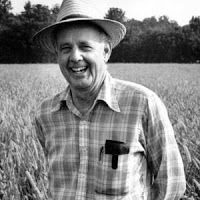
You’ll have to excuse me. I am not going to tell you about one of my favorite books this time. Instead, it’s an entire library of good reading from one of the finest writers of our (or any) time.Wendell Berry loves the land. For years, he farmed the old-fashioned way in Kentucky, with horses and hand tools and husbandry that is about as far removed from modern “agribusiness” as you can get. He’s an outstanding poet, but we’ll leave that for another time. He writes some of the most incisive essays and social commentary you’ll ever read, but we’ll leave that for another time, as well.His novels and stories of what he calls the “Port William Membership” are more than worth reading. Every one of them, and there are at least a dozen of them (I don’t have an exact count, because some of the novels stand alone but are also included in short novel collections), is worth reading. Port William is a fictional small town in Kentucky, surrounded by land farmed through generations by the Catletts, Coulters, Penns, Feltners, and others. They are deceptively deep, touching, realistic stories of people and land, loves and friendships, work and play. Sometimes tragic, sometimes humorous, and always beautiful, Berry’s stories can make you wonder why we let the world change the way it has. Read Wendell Berry. He writes every word of every book with pencil and paper—handcrafted prose in every sense of the word.
Published on December 03, 2018 13:53
November 22, 2018
Giving thanks.
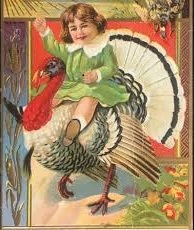
No matter your opinion of the stories and myths and fables and fairy tales about how Thanksgiving came to be, there is no doubt we all have a lot to be thankful for. And it is good to have this day of celebration to remind us of that. So, amid all the roast turkey and stuffing, the marshmallow-laden sweet potatoes, the parades and football games, the political arguments and family spats, let’s not forget to thank the Lord above and those around us for all that is good in our lives and our world. By any measure, on any scale, our blessings outweigh the trials and tribulations.Happy Thanksgiving. And Thank you.
Published on November 22, 2018 08:17
November 12, 2018
We’ve got to involve young people!

Over the years I have been involved in a number of membership organizations related to Western culture and history. There is a common outcry among them: “Look around! Everyone here has gray hair! If we don’t get young people involved, we’re done!” (Add as many exclamation points as you like.) You’ve probably heard the same stuff.It would be silly to deny that most such organizations are largely populated by people of late middle age and beyond. The evidence is there, for everyone to see.But does it matter?Now, there is certainly nothing wrong with attracting younger members and I am all for it. On the other hand, I see no reason to panic.Because, if my observations over the past couple of decades (or longer) are any indication, while members aren’t getting any younger, they aren’t getting any older, either. On average, of course. I suspect the age range, the mean, the average, and all those other measures have remained fairly constant.The reason? I believe interest in such things is something most people have to grow into. When you’re a teenager, a young parent, a working stiff, your time and energy are necessarily devoted to other things. You tend to be more concerned with whatever you’re dealing with today and what you’ll be facing tomorrow than with what happened in the past.But when the pace of life decelerates, and your outlook on life changes with maturity, so do your interests. And, for a lot of people, those interests include history, and ancestry, and all the other things that made cowboy culture what it is. And continuing and preserving all that stuff becomes important to us. Keep after those young people. Some of them will see the importance of the things we older folks value. But most of them probably won’t. At least not until they become older folks.
Published on November 12, 2018 11:45
October 30, 2018
Lies They Tell Writers, Part 47: Your story needs an arc.

I read and hear a lot about “story arc” these days.I confess I don’t really know what it means. As near as I can tell, it is more or less the same kind of thing as the “dramatic structure.” It could be the “three-act structure” or maybe the “five-act structure.” Or even the “hero’s journey” structure I used to hear a lot about, but not so much anymore. It all comes down to (as near as I can tell) what happens to your character(s) between the beginning and end of your book. How they change, and what changes them, or something like that.Why this sort of thing needs a name, I don’t know. But “arc” does not seem to me a very good name. I see an arc as a curved line connecting two points. But stories seldom follow a curved line. They go up and down, down and up, sometimes sideways, and sometimes they go backward as you move along from page to page. Now, some may say this is all part of the “arc.” But, if your line isn’t a curved line connecting two points, is it still an arc?Maybe it is. I don’t know. All I know is that your characters should (and will) decide how the story goes. And if you let them, they’ll blaze a much better trail than a carefully plotted “arc.”
Published on October 30, 2018 12:24
October 19, 2018
Really Stupid Words, Chapter Four

American English is a rich language. It’s always changing and evolving. New words and usages come and go. Many that come along are helpful. They clarify, they improve, they enhance and enrich. But some are just plain stupid. They obfuscate, they complicate, they confuse. They reveal a lack of understanding. One that really sets my teeth on edge (sometimes) is “issue.”Now, this one is complicated because “issue” is a word of many meanings. Magazines have issues. Births have issues. Politics has issues. Discussions have issues.People do not. Ninety-nine times out of ninety-nine, when someone says they have an “issue” what they really mean is they have a problem. What’s wrong with “problem”? Everyone knows what it means and, unlike “issue,” it means pretty much one thing.But some time ago, within my memory, someone in the psychobabble business decided “problem” was negative, and, well, we can’t have that, can we. If we use a word like “problem” that may have negative connotations, we might hurt someone’s feelings. “Issue” is a whole ’nother thing. Nothing negative about “issue.” In fact, in this use, there’s really nothing much at all in the word “issue.” Except that when it gets abused like this, I, for one, have a problem.
Published on October 19, 2018 15:10
October 11, 2018
Turn to page 26.
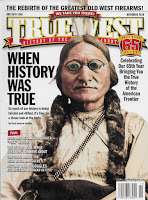
The latest issue of True West magazine features an article I wrote about the Massacre at Bear River (a subject I have written a lot about) and Sagwitch, the Shoshoni leader who managed to hold the survivors together and maintain the very lifeblood of the band. The United States Army slaughtered some 250 to 350 children, old folks, women, and men on January 29, 1863 on the banks of the Bear River in Cache Valley. Colonel Patrick Edward Connor, the man behind the massacre, estimated 164 Shoshoni survived. That survival was tenuous, given that the army destroyed their lodges, pilfered or ruined food stores, stole the horse herd, and left them to die in sub-zero cold. Sagwitch, wounded in the hand and having a horse shot out from under him, managed to escape the slaughter and, later, led his people to a future much different than any of them could have imagined.Read about it in the November 2018 issue of True West . If you’re not a subscriber, pick up a copy from a newsstand. Then turn to page 26.
Published on October 11, 2018 11:49
October 4, 2018
Utah, top to bottom.
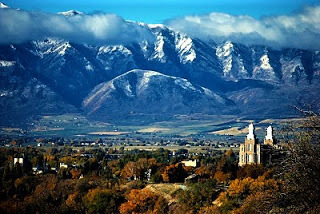
Utah is about 400 miles, more or less, from top to bottom. Soon, I’ll be covering most all that distance over the course of a few days.On October 10, I’ll be addressing the Cache Valley Historical Society, talking about “Momentous Moments in the Old West You May Have Missed,” which happens to be the subtitle of my book The Lost Frontier . We’ll meet in Logan, Utah, which is a scant 20 miles short of as far north as you can go in Utah. A few days later, on October 12 and 13, I’ll be presenting workshops on writing poetry, improving prose, and writing short stories at the Kanab Writers Conference in Kanab, Utah. Which is only about seven miles shy of Arizona. So I will be traveling, essentially, from border to border in my fair state. Fortunately, the miles in between are populated with beautiful scenery, interesting places, and friendly people. And, I always enjoy a good road trip.If I’m lucky, I’ll see you there—at one end or the other.
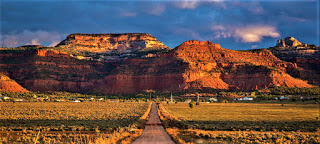
Published on October 04, 2018 07:04
September 25, 2018
“Father” goes to college.

The latest issue of Utah State magazine, the alumni publication from Utah State University, features my new novel, Father unto Many Sons . Included is a brief excerpt from the book—the Preface—and a brief bio about yours truly.Although it has been a long, long, long time since I graduated from USU, I still have a lot of fond memories of my years going to school and working in Cache Valley, and am always on the lookout for an excuse to visit. (One such excuse takes me there October 10 to address the Cache Valley Historical Society; more on that later.)Take advantage of this opportunity to increase your education. Take a look at Father unto Many Sons in Utah State magazine.
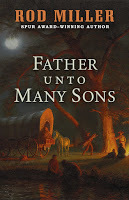
Published on September 25, 2018 08:35
September 17, 2018
I’ll be Write Here.

Writers conferences are fun. You get to meet people who love words and stories. You get to share thoughts, exchange ideas, and discuss experiences. Most of all, you get to learn.When I go to a writers conference, it’s usually to teach. But even then, I always learn something—perhaps more than I teach.Come September 21 and 22, I will be at Snow College in Ephraim, Utah, for Write Here in Ephraim. I’ll be hosting a “bootcamp” session and giving presentations on improving prose and writing effective opening lines. And, lo and behold, I will be giving the keynote address.I have taught at conferences large and small, and I think Write Here in Ephraim is about the right size—enough participants to provide a broad spectrum of experience and approaches, but not so many that participants get lost in the shuffle.If you’re a writer—or want to be a writer—you would do well to join us at Write Here in Ephraim. I’m looking forward to being Write Here (or right there).
Published on September 17, 2018 07:46
September 9, 2018
My Favorite Book, Part 16
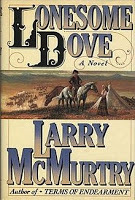
It would be difficult, I believe, for any list of outstanding Western novels to exclude Larry McMurtry’s Lonesome Dove. I have read several McMurtry novels, and the truth is I run hot and cold on his writing—some of the books I like, some do nothing for me, some I would not recommend. But when it comes to Lonesome Dove, I am hard pressed to do anything but stand in awe. The main tale, a trail drive from Texas to Montana, is simple enough. But the many intertwining subplots give the book depth and richness, with stories both intricate and complex. But it is the characters that set the book apart from all others. Woodrow Call and Augustus McCrae are an unlikely pair, with well-developed personalities that are at the same time contradictory and complementary. And the supporting characters, the whole long list of them, are likewise realistic and representative of the depth and breadth of humanity.To win the Pulitzer Prize for Fiction—which Lonesome Dove did in 1986—is an accomplishment unrivaled for a novel. For a Western novel, it is almost unprecedented and, for a “cowboy” novel, I believe it is unique.The film adaptation is well done, but it’s about time for me to dive back into the book for, I think, the third time.
Published on September 09, 2018 12:48



